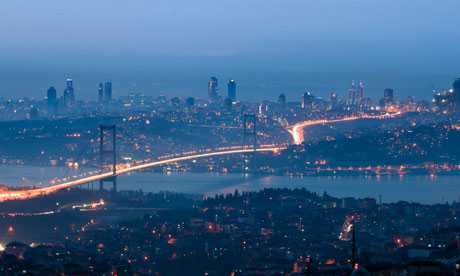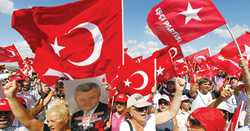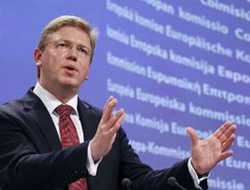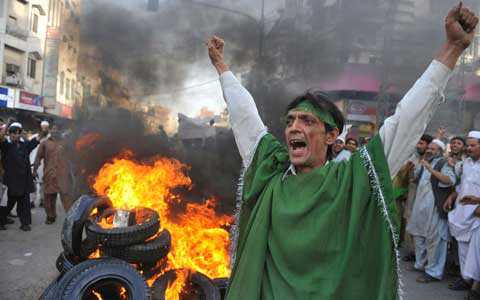Istanbul
Mr President,
Ladies and gentlemen,
It’s good to see so many of you attending a conference on a subject that is of key importance in both economic and political terms.
It’s more than worthwhile to have this discussion with businessmen and -women as well as people in government on both the Turkish and the European side.
As I said yesterday: you are the people that make the EU-Turkey relationship work.
And it does work: the European Union is by far the largest market for Turkish products (accounting for some 46% of its global trade) and the source of most of its foreign direct investments, nearly 80% of which are European in origin. Likewise, Turkey is already of major importance for Europe’s economy (it is our 7 th trading partner) and yet there is plenty of potential still untapped; With growth rates of 9% last year and, hopefully, 7.5% this year, Europe’s business people know the way to Turkey.
Perhaps the most telling fact – both of the European interest and of Turkish potential – is that, despite the crisis, Europe has maintained and even increased its share of Turkey’s FDI.
This is much more than your average preferential partnership: our economies are deeply and fundamentally intertwined – first through the Customs Union and the accession process that provide the impetus for deep integration, and then through the businesspeople, investors and consumers that make such a union come to life.
We know that EU investors have cast their nets far broader than the traditional trade in goods, so that they now feature in almost every sector of the Turkish economy: from machinery to renewable energy, from insurance services to grocery retail.
That is also increasingly the case the other way around: if the Belgian company Deceuninck now produces PVC window frames in Turkey, the Belgian chocolates they eat during board meetings are made by Turkish companies, since the acquisition of Godiva by the Yildiz Holding in 2008. And the fact that a group of Turkish companies recently took over the French electric vehicle manufacturer Tilter goes to show that the relationship is not just strengthening and broadening but also becoming more and more balanced.
Clearly, the economic world has been unimpressed by the often adverse political conditions in our partnership.
But this does not mean it has been uninterested: some of the most vocal supporters of invigorating the relationship between us are found in the business community – and rightly so.
YOU know that, on the whole, economic integration has so far been a success;
YOU realise that the problematic issues that do occur every once in a while need a pragmatic solution, because the overall benefits of the economic bond far exceed the downsides of adapting to a predictable and transparent trade regime.
That is why I try to enlist YOU in the fight against protectionism.
We too, as politic ians, must not be defensive in this: we need a trade regime that fits our everyday economic reality, one that helps rather than hampers future opportunities. In the context of the EU-Turkey Customs Union, that means we just have to find realistic solutions to the trade irritants that threaten to sour the debate between us.
Both Turkey and the European Union are far from defensive in their general approach to trade policy:
The EU is the most open economy in the world; a staunch supporter of the WTO; convinced of the need for a multilateral agreement in the DDA and convincing in its approach to regional and bilateral free trade deals.
Though it is a difficult message in a period of crisis, we remain convinced that our economic openness is to our advantage; that now, more than ever, we need to tap into sources of growth around the world, while our own means of providing a stimulus to the economy are much more limited than before.
Even more than that, of course, we need to stabilise financial markets and restore trust in the euro. We must not underestimate the turmoil in the eurozone, of course, but I can tell you that the sense of urgency and the political will to do whatever is necessary to put government finances back in order and support the euro are unprecedented. We will go through hard times, but Europe will come out stronger than before.
Turkey, too, is offensive in its approach to trade policy – eagerly engaging with Asian, Middle Eastern and Mediterranean economies because it is politically and economically interesting to do so. I see this not as a threat but as an opportunity for EU-partners, as Turkish exports are often fuelled by European imports and stimulated by European investments.
And if Turkey strengthens its economic bond with the new, democratic regimes in the Mediterranean, whose young and eager populations so desperately need some light at the end of their economic tunnel, we can only applaud that.
There is no need for jealousy in economic partnerships.
And yet there IS plenty of jealousy around in today’s economic world.
As I stressed in my speech yesterday: I AM afraid economies around the world are affected by the protectionist virus.
The number of protectionist measures put in place since the crisis has steadily increased. Efforts and commitments to reduce them have not been sufficient.
A new generation of protectionist measures is growing: new industrial policies of several G20 members raise concerns about open trade and investment, as they are often based on import substitution, discriminatory attitudes and domestic preference, local content requirements and restrictions in public procurement.
Turkey, of course, is not one of the main culprits, but neither is it immune from the pressure that haunts governments worldwide and from its own structural constraints.
Let me just quote a few of the worrying trade irritants that hamper our relationship for the moment:
1. Turkey has become one of the most important users of safeguard measures and it systematically prolongs safeguard measures beyond their initial period of application – despite the fact that in many cases the industry has recovered. In addition, Turkey always maintains the measures during the time of the investigation by imposing provisional measures. Turkey has also recently imposed a measure (PET) on the basis of findings of threat of injury, the lowest injury standard in WTO.
This is excessive and irregular use of safeguard measures, which can be seen as breaking WTO principles.
2. Turkey requires an import licence for second hand goods. Some listed second-hand goods can be imported either freely or through licences granted by various Turkish authorities. The lists do not refer to environmental, health or safety standards – only to price and quantity. The main objective is simply to restrict the importation of second hand goods and allow only a limited number of machinery necessary for the Turkish manufacturing industry. This is a breach in the free movement of goods within the Customs Union.
3. Early 2011 Turkey announced it would start safeguard investigations into the imports of a number of apparel and textile products. This has led to increased customs duties on textiles imports. Contrary to the initial decision, EU companies are not exempt: EU businesses exporting non-EU originating products to Turkey are now charged the highest rate of the duty – which is 30% – and the implementation rules are far from clear.
4. Turkey has laid down new requirements for imports of pharmaceuticals and, since March 2010, no longer accepts the EU Good Manufacturing Practices certificates. Instead, companies depend on Turkish official inspectors to get a certificate for new medicines or variations of existing products. This has led to significant delays in the registration of new pharmaceutical products in
Turkey. These new requirements coupled with the limited inspection and enforcement capacity of the Turkish authorities are de facto banning imports to Turkey.
The principle of free circulation of products between the EU and Turkey is not respected and the system doesn’t fit Turkey’s obligation to align its legislation on pharmaceuticals with the EU acquis .
5. Turkey has introduced export restrictions on copper scrap (similar to restrictions on paper and aluminium scrap), based on a non-automatic licensing scheme, the conditions for which are very difficult to meet (on site inspections, documentation on export connection etc). The effects thereof may be contrary to Customs Union rules prohibiting quantitative restrictions on exports.
Ladies and gentlemen,
In the larger context of the EU-Turkish relationship that is so vital in economic terms, we HAVE to address these issues find concrete and transparent solutions for them, and work them out TOGETHER.
Their short-term benefits for SOME far outweigh the negative long-term impact for ALL. Reducing the current account deficit is certainly a must and efforts should be deployed to cope with it. However, measures of a trade and fiscal nature clamping down on imports from close partners are patchwork actions that miss the wider picture.
Thank you very much.





